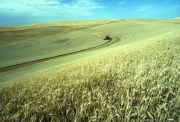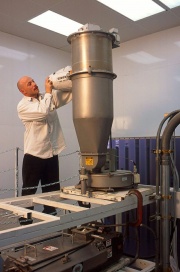Difference between revisions of "Wheat flour"
Jump to navigation
Jump to search
(username removed) |
m (Text replace - "== Authority ==" to "== Sources Checked for Data in Record ==") |
||
| Line 13: | Line 13: | ||
Flour paste contains both starch and gluten (proteins). Starch paste contains only starch. | Flour paste contains both starch and gluten (proteins). Starch paste contains only starch. | ||
| − | == | + | == Sources Checked for Data in Record == |
* G.S.Brady, ''Materials Handbook'', McGraw-Hill Book Co., New York, 1971 Comment: p. 868 | * G.S.Brady, ''Materials Handbook'', McGraw-Hill Book Co., New York, 1971 Comment: p. 868 | ||
Revision as of 22:04, 1 May 2016
Description
A fine, white powder obtained from grinding seeds of cereal grasses of the genus Triticum. Wheat flour is primarily used for food products. It contains starch and glutenous proteins. It will form a thick, viscous paste with boiling water that, once dried, is strong and water-insoluble. Wheat flour paste has historically been used as a size for textiles and as a paste for relining and hinging. It is no longer in used in conservation because it is susceptible to attack by microorganisms and because it can only be removed with the aid of enzymes.
Synonyms and Related Terms
wheat paste; harina de trigo (Esp.); farine de blé (Fr.); farina di grano (It
Other Properties
Flour paste contains both starch and gluten (proteins). Starch paste contains only starch.
Sources Checked for Data in Record
- G.S.Brady, Materials Handbook, McGraw-Hill Book Co., New York, 1971 Comment: p. 868
- Hermann Kuhn, Conservation and Restoration of Works of Art and Antiquities, Butterworths, London, 1986
- Book and Paper Group, Paper Conservation Catalog, AIC, 1984, 1989

